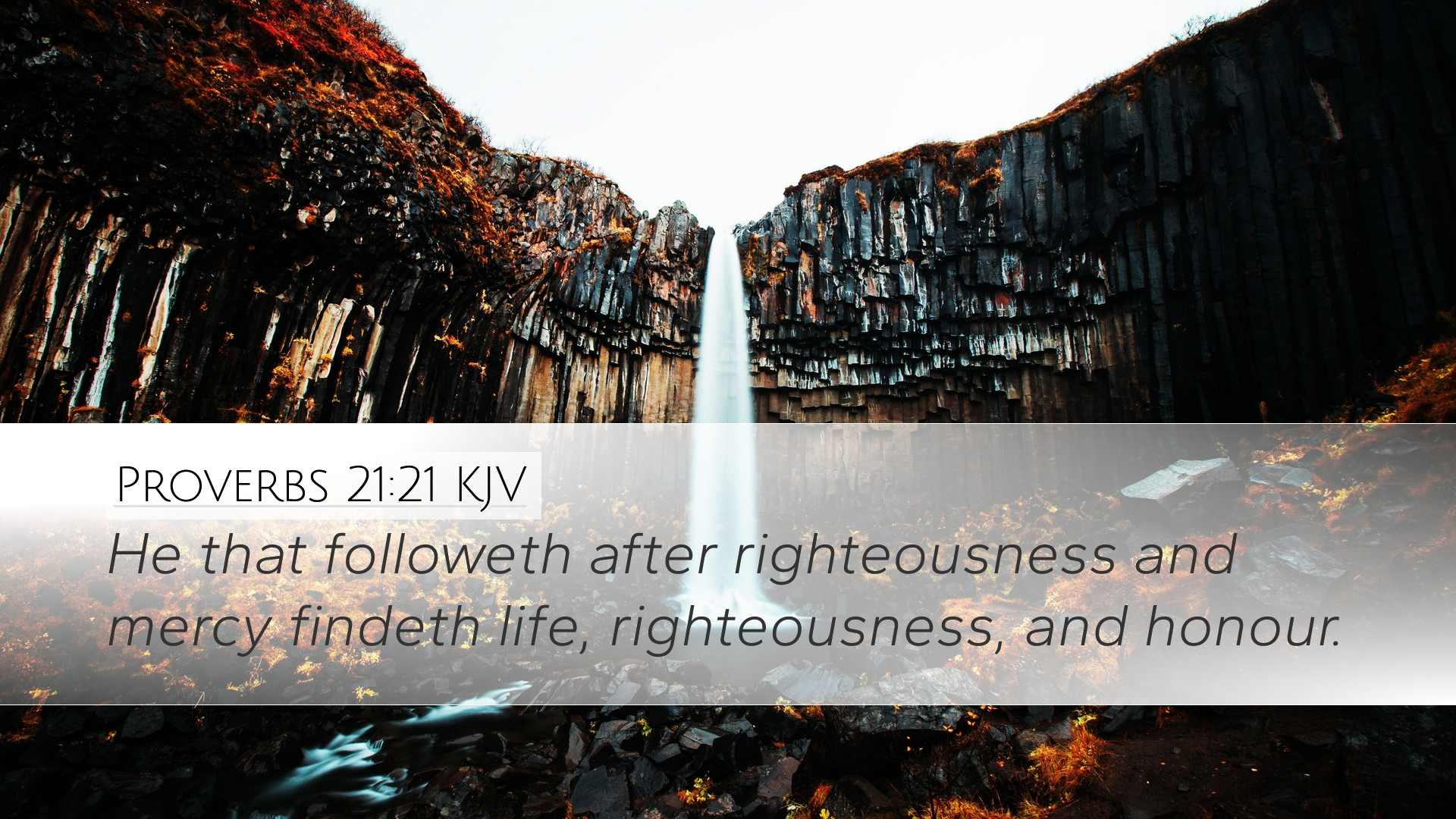Commentary on Proverbs 21:21
Verse: "He who follows righteousness and mercy finds life, righteousness, and honor." (Proverbs 21:21, NKJV)
Introduction
The Book of Proverbs is a rich tapestry of wisdom literature, offering practical and ethical guidelines for living a life that is pleasing to God and beneficial to oneself and society. Proverbs 21:21 encapsulates the pursuit of righteousness and mercy as the pathway to a fruitful and honorable existence. This commentary combines insights from several esteemed public domain scholars, namely Matthew Henry, Albert Barnes, and Adam Clarke, to explore the implications of this verse.
The Pursuit of Righteousness
Matthew Henry emphasizes that righteousness is a characteristic of those who are in a right relationship with God. In seeking righteousness, one engages not only in moral correctness but also in alignment with divine justice. It is not merely about avoiding sin but actively pursuing good. Henry notes the connection between righteousness and moral integrity, suggesting that a life devoted to righteousness inevitably aligns with the will of God.
Albert Barnes adds to this notion by delineating righteousness as not just a single virtue but a composite of many qualities that reflect the holy nature of God. Following righteousness indicates a life of intentionality, where choices are made with sincere consideration of ethical implications. The pursuit of righteousness is portrayed as both a personal and communal obligation, impacting family, society, and ultimately, the Kingdom of God.
The Role of Mercy
Adam Clarke discernibly points out the significance of mercy as intrinsic to the character of God and, consequently, should be reflected in the lives of His followers. Clarke notes that mercy involves compassionate action towards others and an understanding of their struggles. The harmony between righteousness and mercy suggests that true righteousness cannot exist in a vacuum devoid of compassion.
This commentary posits that while pursuing righteousness, one must embody mercy, as the two virtues serve as complementary forces. Mercy tempers the pursuit of justice and prevents the righteousness from becoming harsh or legalistic. Thus, following mercy is not a deviation from righteousness but rather an essential component of it.
Findings of Life, Righteousness, and Honor
The latter part of the verse promises that those who embrace righteousness and mercy will find "life, righteousness, and honor." This statement is rich in implications. Matthew Henry notes that "life" in this context relates not merely to physical existence but spiritual vitality and fullness, a life characterized by divine favor and joy. Such a life is marked by peace and fulfillment, a profound sense of purpose, and connectedness to God.
Albert Barnes interprets the term "righteousness" in this context not as a repeat mention but as indicative of the internal state of being. He suggests that those pursuing righteousness are invariably experiencing a righteousness that arises from their character and actions, leading to a virtuous cycle where the pursuit of righteousness cultivates even more righteousness.
Likewise, Adam Clarke addresses "honor" as an external acknowledgment of an internal reality, suggesting that true honor comes from the lived expression of one's character consistent with God’s teachings. Thus, the promise of honor is not derived from social status or achievements but from a life characterized by moral excellence and kindness.
Conclusion
The exhortation in Proverbs 21:21 to follow righteousness and mercy is a profound call toward an integrated life that reflects God’s character. As illustrated by the collective wisdom of Henry, Barnes, and Clarke, this verse serves not only as an ethical guide but as a spiritual blueprint for holistic living that results in genuine fulfillment, moral integrity, and respected honor in the community.
In application, pastors, students, and scholars are encouraged to ponder the balance between righteousness and mercy in their lives and communities. As they seek to follow these tenets, they are likely to experience the abundant life that God promises—full of righteousness and honor, resonating with the teachings of Christ, who perfectly embodied both righteousness and mercy.


